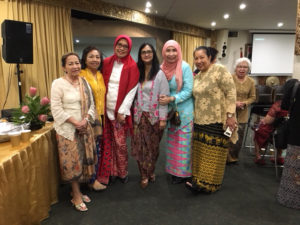Indonesian women celebrate empowerment, equality
 Indonesian women living in Melbourne recently celebrated Kartini Day, which celebrates the life of women’s rights activist Raden Ajeng Kartini and is a reminder of the equality that women in Indonesia have achieved over generations.
Indonesian women living in Melbourne recently celebrated Kartini Day, which celebrates the life of women’s rights activist Raden Ajeng Kartini and is a reminder of the equality that women in Indonesia have achieved over generations.
This year, to celebrate the day, the Australia Indonesia Youth Association brought to cinemas across the country 2017’s biggest Indonesian film.
Titled ‘Kartini’, the film tells the story of the Indonesian women’s emancipation heroine. The screening in Melbourne was sold out.
Indonesian expatriate Anita Halliday says that Kartini day is a symbol of the empowerment of modern women in Indonesia
One the day, a traditional costume is worn on Kartini Day – known as Kebaya Kartini.
“This is the type of kebaya – or traditional blouse-dress – worn by aristocratic Javanese women, especially during the lifetime of Raden Ajeng Kartini,” Anita said.
Anita said that Kartini Day was similar to International Women’s Day and focused on the issue of the empowerment of women.
All across Indonesia, female students and teachers in schools dress in Kebaya, while the male students dress in Batik. Various competitions such as fashion shows, cooking competitions and flower arrangement competitions are held to enliven the commemoration.
Kartini was committed to improving the lives and opportunities of women and her husband supported her to establish a school for Javanese girls in the 1900s.
With help from the Dutch government, in 1903 she opened her first Indonesian primary school for native girls that did not discriminate based on their social status.
The school taught girls a progressive, Western-based curriculum. Kartini believed the ideal education for a young woman encouraged empowerment and enlightenment.
“There are more stories behind the commemoration of Kartini Day. It’s not just merely celebration. Deep beneath the festivity, Kartini Day has been commemorated to remind us that women and men are supposed to be equal,” Anita said.
Kartini was born into a noble family on April 21, 1879 in the village of Mayong, Java, Indonesia.
She was the daughter of Assistant Head of Regency who was also the descendant of a noble family. During that period, women’s access to higher education was restricted.
Kartini even experienced the Javanese tradition of ‘pingitan’, in which a teenage girl is secluded at home and her activities are limited until she marries.
Kartini spent this time by reading books she got from her relatives. She also sent letters to her Dutch friends, protesting about gender inequality and about Javanese traditions such as forced marriages at a young age and ‘pingitan’, which also denied women the freedom to pursue an education.
She was married to Raden Adipati Joyodiningrat, the regent of Rembang, at the age of 24.
Kartini had recently been offered a scholarship to study abroad, but her marriage made that impossible.
Happily, her husband supported her to establish a school for Javanese girls. With help from the Dutch government, in 1903 she opened her first Indonesian primary school for native girls that did not discriminate based on their social status.
The school promoted lifelong education for women.
Laurie Nowell
AMES Australia Senior Journalist












